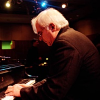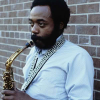Home » Jazz Musicians » Giuseppi Logan
Giuseppi Logan
Logan leaves behind a small body of recorded work, but his standing in the improvised avant-garde is considerable. He emerged just as free jazz was beginning to crest as a movement, and even amidst a crowded field of iconoclasts, he distinguished himself as an original.
In 1964, shortly after his arrival in New York, he participated in The October Revolution in Jazz, alongside artists like trumpeter Bill Dixon and pianist Cecil Taylor. Several weeks later he recorded The Giuseppi Logan Quartet for ESP- Disk, with impeccable partners: pianist Don Pullen, bassist Eddie Gomez and drummer Milford Graves.
Logan’s second album, More, was recorded live at The Town Hall during a concert of ESP-Disk artists on May 1, 1965. (The same concert yielded saxophonist Albert Ayler’s classic Bells.) His group worked often over the next year or two, notably on a college tour organized by the label; he also appears, playing flute, on College Tour, by the avant-garde vocalist Patty Waters.
In performance, Logan would not only play saxophone and flute but a range of other instruments, with varying degrees of technical facility. Reactions were mixed, with many “New Thing” converts on one end of the spectrum; the other end held a good many detractors, including the bulk of jazz’s critical establishment.
Whitney Balliett, reviewing a performance at Judson Hall for The New Yorker, noted that Logan and his band “had the air of mediums possessed.” That furious intensity wasn’t a turn-on, as Balliett made painfully clear. “Logan’s sheer dexterity masks sly sins,” he wrote, and proceeded to enumerate a few:
His violin work, made up of a million short, scratchy notes, was demonic; his trombone was equally congested; his trumpet playing was high and strangled; his alto and tenor saxophones — he dangled each instrument from his mouth like a cigarette — were a mockery of Ornette Coleman; his Pakistani oboe was a Pakistani oboe; and his vibraphone sounded as if he were pouring loose change into it.
A short film from 1966, by Edward English, shows Logan in his East Village neighborhood with his family. A hand- lettered sign on his door reads “GIUSEPPI LOGAN / Music Teacher / All Instruments / Vocal Coach.” At one point, he is heard in voiceover: “If people in any other profession are able to support their families by doing what they do, I mean, why can’t I?” he says. “Or other musicians that are doing something that’s good for society?”
Read moreTags
Giuseppi Logan: The Giuseppi Logan Quintet
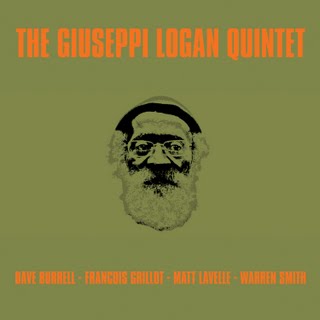
by Clifford Allen
Giuseppi Logan The Giuseppi Logan Quintet Tompkins Square 2010
In terms of surprising musical rediscoveries, 2010 has started off rather auspiciously with the first recording of reedman and composer Giuseppi Logan in over 40 years. Logan's appearances in the heady days of New York's fire music were scattered but strong and otherworldly affairs--sideman work with trombonist Roswell Rudd (Everywhere, Impulse!) and vocalist Patty Waters (College Tour, ESP) in 1966, performances as part of trumpeter ...
Continue ReadingGiuseppi Logan: The Giuseppi Logan Quartet
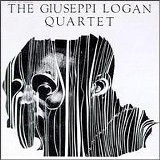
by Lyn Horton
Generally, innocence drives the impetus for how to discover the next place successfully. An intriguing process of discovering various levels while creating appears on the re-release of the Giuseppi Logan Quartet (ESP Disk, 2008). Originally recorded in 1965 in New York, this recording imparts the musical uniqueness of multi-reedman Giuseppi Logan's sound.
A seeming cacophony penetrates the incidence of the music led by Logan, with a pervasive sourness that emanates from whatever reed instrument he plays. Logan offers ...
Continue ReadingThe Giuseppi Logan Kickstarter Project - New 180 Gram Vinyl Album From Legendary Sax Player
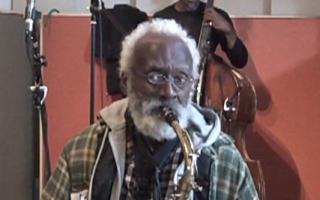
Source:
Ed Pettersen
The Giuseppi Logan Project delivers a new album from a rising avant-garde jazz player of the sixties who has been lost to the music world for over 30 years. The supporting players are stellar in their own right featuring ace jazz pianist Cooper Moore, bassist Larry Roland, and the unique electric violin of Tracy Silverman. The release is a limited edition 180 gram vinyl album with hi-res digital downloads available if you don't own a record player. The campaign to ...
read more
Giuseppi Logan Quintet at The Stone (NYC) on August 15th

Source:
Tompkins Square
"A fantastic return to form for Giuseppi Logan—a contemporary record, but one that grabs us with just as much force as his famous 60s album for ESP!"—Dustygroove.com “An astonishing comeback record"—All Music Guide (4 stars) Legendary saxophonist Giuseppi Logan will perform with his Quintet at the Stone in NYC on Sunday August 15th, 10pm. The master musician, who just turned 75, has released his first album in 45 years on NYC's Tompkins Square label to wide acclaim. 'Giuseppi Logan Quintet,' ...
read more
Giuseppi Logan to Play 1st Annual Albert Ayler Festival

Source:
Michael Ricci
Legendary saxophonist Giuseppi Logan will perform at the 1st Annual Albert Ayler Festival, July 10th 2-10pm Riverwalk Commons, Roosevelt Island. FREE. Logan, who knew ESP labelmate Ayler in the 60's, has released his first album in 45 years, The Giuseppi Logan Quintet, featuring Dave Burrell, Francois Grillot, Warren Smith and Matt Lavelle. “With Giuseppi, it's always fresh. He's going to do things that no other saxophone player does." --Dave Burrell “There's a vibrancy to the music that's unexpectedly touching" --WIRE ...
read more
Giuseppi Logan Live on WFMU This Friday!

Source:
Michael Ricci
Legendary saxophonist Giuseppi Logan celebrates his 75th Birthday (actually May 22) with a rare live broadcast on WFMU this Friday, May 21 around the 11am hour. Logan has released his first album in 45 years on NYC's Tompkins Square label. “With Giuseppi, it's always fresh. He's going to do things that no other saxophone player does." --Dave Burrell “There's a vibrancy to the music that's unexpectedly touching" --WIRE “There's a heartening tenderness and warmth to his playing" --Downbeat “An astonishing ...
read more
Giuseppi Logan Celebrates 75th Birthday with Gig, Live Broadcast

Source:
Michael Ricci
"With Giuseppi, it's always fresh. He's going to do things that no other saxophone player does." - Dave Burrell “There's a vibrancy to the music that's unexpectedly touching" - WIRE “There's a heartening tenderness and warmth to his playing" - Downbeat “An astonishing comeback record" - All Music Guide (4 stars) Legendary saxophonist Giuseppi Logan will celebrate his 75th birthday on May 22nd. To mark the occasion, he will play a special show at Issue Project Room in Brooklyn NY ...
read more
Giuseppi Logan Plays Two Record Release Concerts

Source:
Michael Ricci
Legendary saxophonist Giuseppi Logan will play two concerts with his group to celebrate the release of his first album in 45 years, The Giuseppi Logan Quintet. The album features two of his closest collaborators from the '60s; Dave Burrell and Warren Smith. He will perform in New York City at Bowery Poetry Club, Tuesday March 16th at 11pm. Giuseppi also returns to his birthplace, Philadelphia, on April 1 to perform for the first time in decades, at the Ars Nova ...
read more
Legendary Saxophonist Giuseppi Logan Releases First Album in 45 Years

Source:
Michael Ricci
Legendary saxophonist Giuseppi Logan will release his first album in 45 years on NYC's Tompkins Square label, February 23, 2009. Logan recorded two albums for the ESP label in the mid-60's featuring Eddie Gomez, Don Pullen and Milford Graves; The Giuseppi Logan Quartet and More. The Giuseppi Logan Quintet, recorded in September 2009, reunites Logan with two of his closest collaborators from the '60's--pianist Dave Burrell and drummer Warren Smith. Also joining him on the session are Francois Grillot, bass ...
read more



